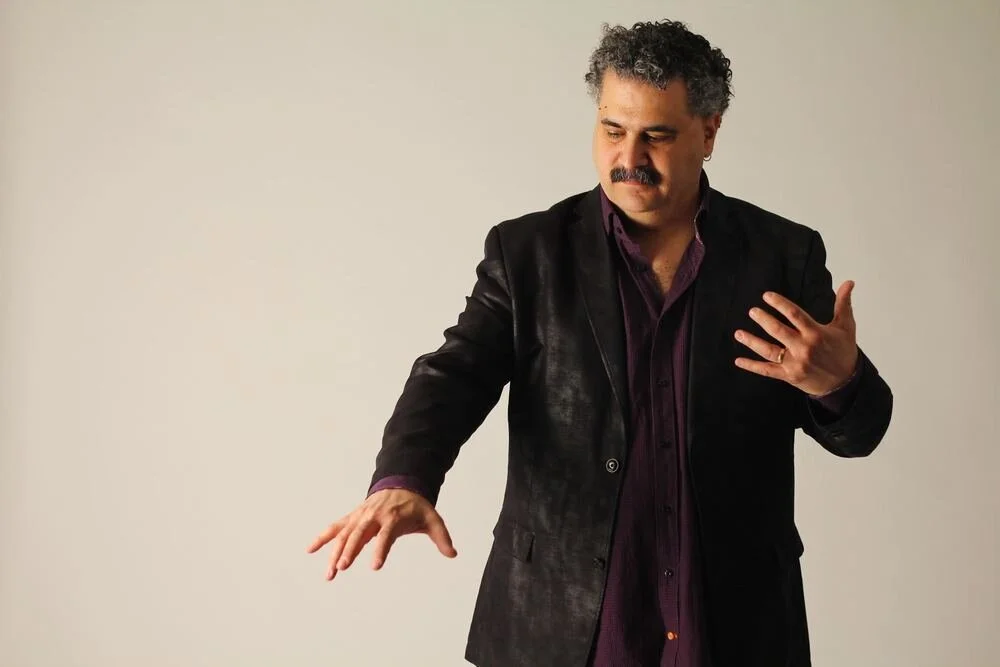Program
Muse of Fire* (8’)…………………….…….Alexis Alrich (b. 1955)
Rendezvous I* (5’).……………..…..Gary Heaton-Smith (b.1986)
Gravity (11’)……………..……………………Marc Mellits (b. 1966)
Intermission
Stress and Flow* (6’)………….…Alejandro Vinao (b. 1951)
Series of Accidents* (6’)……………Shaun Tilburg (b.1981)
Donner (7’)…………………..…….David Skidmore (b. 1982)
Stuck in Loops* (7’)…………… Kenneth Froelich (b. 1977)
*Commissioned by Orphic Percussion
Program Notes
Alexis Alrich
Muse of Fire was composed by Alexis Alrich for the Impetus Percussion Quartet in 2015 (Now Orphic Percussion). The movement you are hearing today is the third and final movement of the composition and unlike the other movements, this is scored for only keyboard instruments. Alexis spent a decade living as a composer and music journalist in Beijing, and this piece is heavily influenced by her experiences in this city.
Gary Heaton-Smith
Rendezvous I was commissioned by Impetus Percussion Quartet in 2016. The work explores the interaction of acoustic and electronic sounds.While conflict is a typical source of drama in music with two opposing mediums, Rendezvous I explores how the sounds of the percussion quartet and audio track work together and compliment each other.The drama is in the conflicting use of style, often pitting tranquility, silence, and chronoasymmetry with volatile energy and unhinged groove. The kick drums work as a single entity throughout the entire work, often articulating rhythms in unison or in hocket to create one unified rhythm.The other instruments weave in and out of complimenting each other and conflicting each other.
Marc Mellits
Gravity by Marc Mellits was written for a combination of marimbas and vibraphones, and the mixture of sound that these different materials make provide a spring board for the musical lines to intersect, bounce, and play off each other, always getting faster, always "falling from the sky," according to Mellits. "While writing 'Gravity,' I found myself thinking about how musical notes and lines can become attracted to each other and follow one another," he wrote in describing the piece. “The overall rhythm and tempo also shifts in a 'gravitational' way. The music continually gets faster and faster, always picking up speed as it falls, spiraling into a new tempo at each musical shift in texture.”
Alejandro Viñao
Stress and Flow - Stress and flow, bright and dark and light and shadow are all description of the juxtapositions and contrasts that characterize this work and are arrived at through various rhythmic processes and the use of electronic means to produce new sound worlds. These sound worlds are not meaningful in themselves but work as an extension of the sound of the mallet instruments featured in the piece. The first movement begins by unfolding dark and heavy rhythms and colours that are gradually transformed into brighter ones and eventually juxtaposed to each other in contrasting ways.
Shaun Tilburg
a series of accidents - “I was a victim of a series of accidents, as are we all.” -Kurt Vonnegut, The Sirens of Titan
A posthumous collaboration of Kurt Vonnegut and Shaun Tilburg. The Sirens of Titan, like many of Mr. Vonnegut’s works, explores the individual’s eternal struggle against forces they cannot resist, nor comprehend; he would challenge the notion that any of us truly has free will.
David Skidmore
Donner is part of a series of pieces entitled "Aliens with Extraordinary Abilities," a cycle of works exploring a common idea: that the same piece of music can move at several different speeds at the same time. Each piece in the series takes its names from a memorable Third Coast Percussion touring experience or inside joke.
Donner was written while Third Coast Percussion was on tour and had a day off in Truckee, CA, near the Donner pass. A group of travelers was stuck in that same area one winter many years ago and had to resort to some questionable dietary practices. Donner is also the German word for thunder.
Kenneth Froelich
Stuck in Loops – STUCK IN LOOPS for mallet quartet, composed for Orphic Percussion, is inspired by the constant dying, restarting, and dying again that occurs in a very difficult video game. The opening gesture represents the starting point in a gameplay loop where multiple paths present themselves. Fittingly, this gesture appears numerous times throughout the work through a musical representation of death and repetition. Each path is represented as a section of music, containing unique challenges for the players to overcome. However, where in a video game trial-and-error is the only possible way to achieve success, in this composition success is inevitable as the work winds its way to a hard-fought conclusion.








